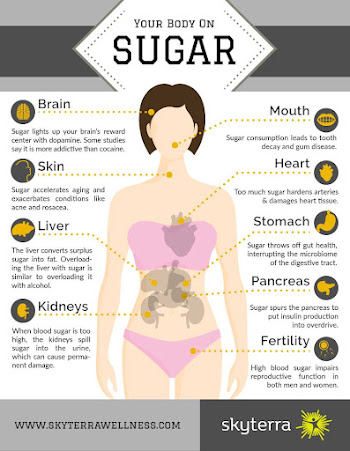Sugar often gets demonized in health conversations—but what is scientific fact versus exaggeration? Let’s dig into what it truly does to your body, why some fears are overblown, and how to enjoy sweetness without health consequences.
🍬 1. Myth: “Sugar is addictive like drugs”
Fact: While sugar can trigger dopamine release in the brain's reward center, it doesn’t meet the clinical criteria for addiction thetimes.co.uk+8nib.com.au+8healthhub.sg+8. The pleasurable feeling from sweets is not the same as addiction to substances like cocaine. Overeating is driven by behavior and combinations of sugar, fats, and salt—e.g., in ice cream—rather than sugar alone .
🧠 2. Myth: “Sugar makes kids hyperactive”
Fact: The so-called "sugar high" is a myth. Clinical studies consistently show no direct link between sugar intake and hyperactivity in children . Behavioral changes often stem from context—e.g., parties—rather than sugar itself.
💔 3. Fact: Sugar impacts heart health and metabolism
-
Cardiovascular risk: Diets with 17–21% of calories from added sugar can increase the risk of dying from heart disease by ~38% compared to diets with 8% sciencealert.com+5nib.com.au+5sugar.org+5health.harvard.edu.
-
Metabolic consequences: Excess sugar burdens the liver, promoting fatty liver disease, insulin resistance, hypertension, inflammation, and weight gain—all of which elevate heart attack and stroke risk .
🦷 4. Fact: Sugar contributes to cavities—though acids do the damage
Sugar fuels harmful bacteria in the mouth, increasing acid production. It's the acid, not sugar itself, that erodes enamel livemint.com+2prathimahospitals.com+2en.wikipedia.org+2. High-frequency consumption of sugary drinks or snacks actually multiplies the caries risk mediclinicinfohub.co.za+15en.wikipedia.org+15foodandwine.com+15.
🍓 5. Myth: “All sugar is evil”—but context matters
-
Natural vs. added sugar: Naturally occurring sugars in fruits and dairy come with fiber, protein, and nutrients. They digest slowly and are not harmful health.harvard.edu+1thetimes.co.uk+1.
-
Brown vs. white sugar: Chemically, they're nearly identical. Brown sugar contains trace molasses but no meaningful nutritional benefit .
⚖️ 6. Fact: Moderation is key—not elimination
Health bodies recommend limiting added sugars to less than 6% of daily calories—about 25 g (~6 tsp) for women and 38 g (~9 tsp) for men foodandwine.com+2health.harvard.edu+2healthmatters.nyp.org+2. Beyond that, excess sugar becomes a source of empty calories—energy with no nutrients .
💡 What happens when you cut back?
-
Energy and mood stabilization: You avoid blood sugar spikes and crashes that cause fatigue and mood swings vogue.com.
-
Health improvements: Reduced skin breakouts, better sleep, and improved insulin sensitivity vogue.com+1healthmatters.nyp.org+1.
-
Lower chronic disease risk: Decreased chances of obesity, type 2 diabetes, fatty liver, heart disease, tooth decay, gout, kidney issues, and cognitive problems .
🍽️ Smart Strategies to Reduce Added Sugar
-
Read labels—watch for hidden sugars (e.g., dextrose, maltose, syrups) healthcentre.nz+15nib.com.au+15healthmatters.nyp.org+15.
-
Swap fruit juices for whole fruit to preserve fiber and slow sugar absorption .
-
Choose minimally processed snacks—instead of cookies or soda, opt for nuts, yogurt, or fruit.
-
Use natural sweeteners sparingly—honey, maple syrup, dates add flavor but still contribute sugar and should be used with care .
-
Maintain a balanced diet: Combine protein, healthy fats, and fiber to regulate blood sugar and reduce cravings.
✅ Final Takeaway
-
Not all sugar is bad, but too much added sugar carries serious health risks.
-
Context matters—prioritize whole foods over processed sugary items.
-
The goal isn’t zero sugar—it’s about informed moderation and making sweet choices smartly.










0 Comments